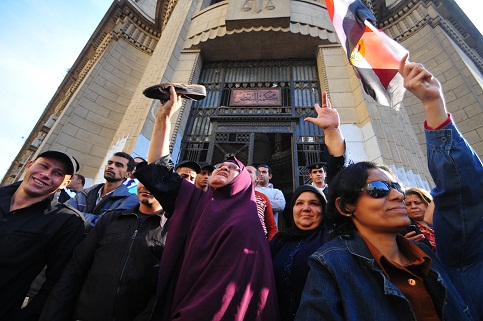By Heba Hesham
CAIRO: The court looking into the qualification of Muslim Brotherhood leader Khairat Al-Shater to contest the presidency recused itself on Wednesday.
“We demanded that the case be considered by another court because the presiding panel of judges announced its views on the case,” Muslim Brotherhood lawyer Sobhy Saleh said.
According to Saleh, the same court said in a similar case regarding the nomination of Ayman Nour that anyone sentenced for a felony and has not been rehabilitated or granted a pardon issued by a law, cannot enjoy any political rights, even if granted a presidential pardon.
Saleh argued that according to the law, if the court has already announced its opinion in the case it should step aside.
Justice Aly Fekry, deputy head of the State Council and the presiding judge, stepped down. The head of the Administrative Courts will decide on a new panel of judges and a new constituency to examine the case, the official news agency MENA reported.
MP and presidential candidate Abu El-Ezz El-Hariry contested at court the political pardon given by the military council to Al-Shater.
El-Hariry’s case was based on Article 56 of the Constitutional Declaration that states that a comprehensive pardon cannot be granted without a law legislated by the People’s Assembly.
Mohamed Ismail, lawyer representing El-Hariry, called upon the court Wednesday to announce its verdict.
On the other hand, Al-Shater’s defense team said that the claimant didn’t provide documents proving the pardon.
Ismail wondered if that meant that there was no pardon in the first place.
In response, Saleh said that if the plaintiff didn’t provide the pardon’s decision to court, there is no case because the court can’t consider something that’s not tangible.
Saleh told DNE that he’s certain of Al-Shater’s legal stance.
“We provided Al-Shater’s criminal record that says he’s never been convicted, therefore we don’t need a pardon.”
In theory, a conviction would disqualify a candidate. The Brotherhood leader was convicted under the Mubarak regime for what was believed to be politically-motivated charges related to his work with the then-banned group. He was released after the Jan. 25 uprising in 2011.
Before the application deadline, the Brotherhood fielded the head of the FJP Mohamed Morsi as a back up to Al-Shater, but according to Sobhy, this doesn’t mean they have doubts regarding Al-Shater’s legal stance.
“The legal part is one thing and the political one is another. Politics can’t be guaranteed,” he said.



